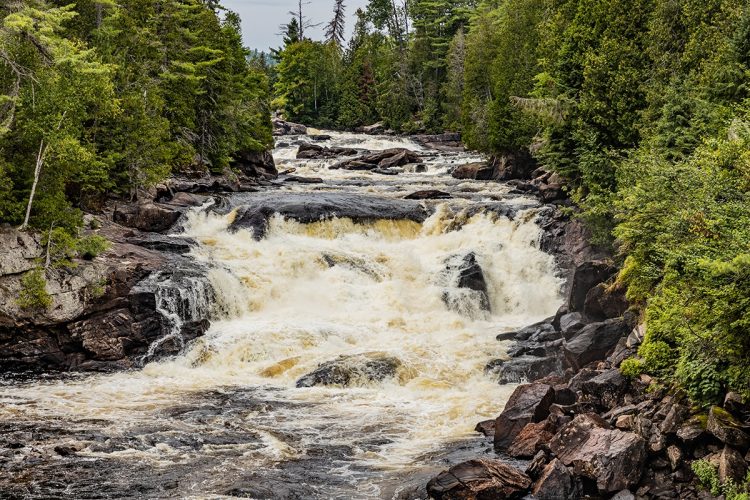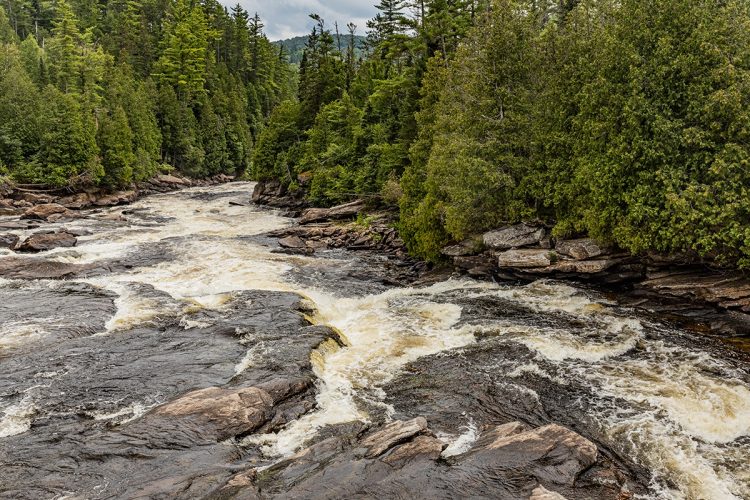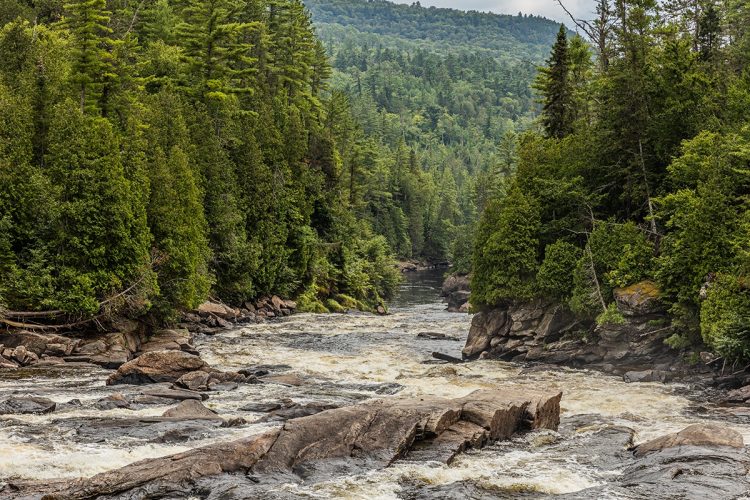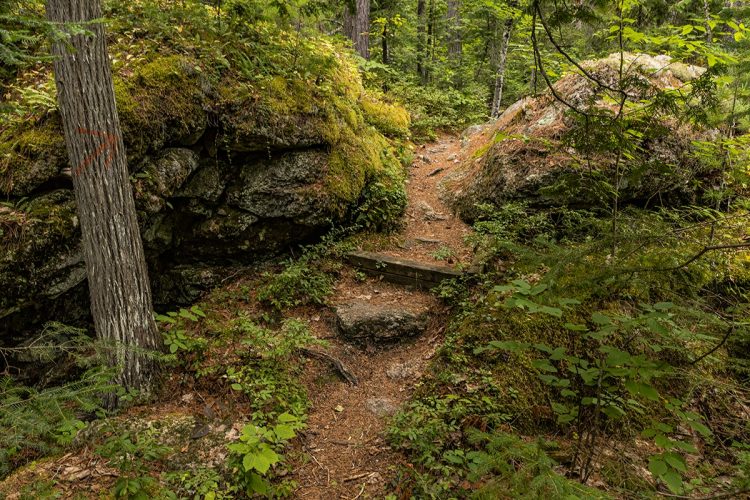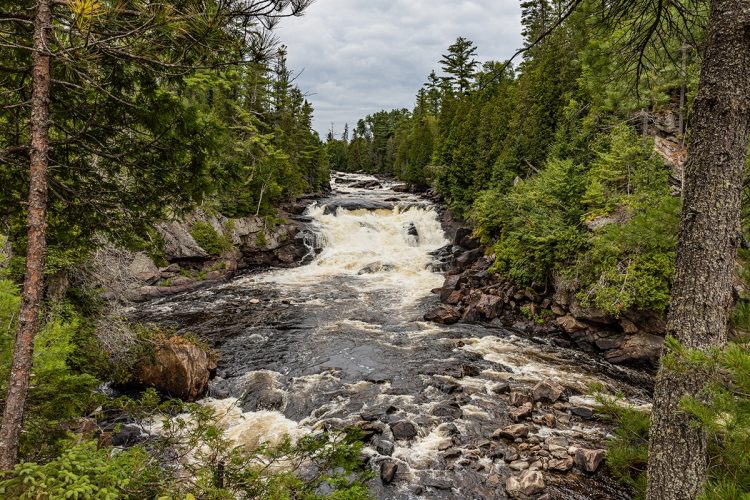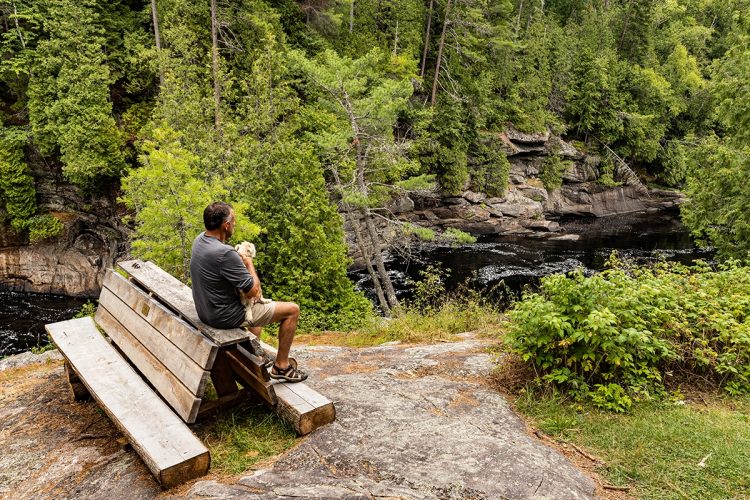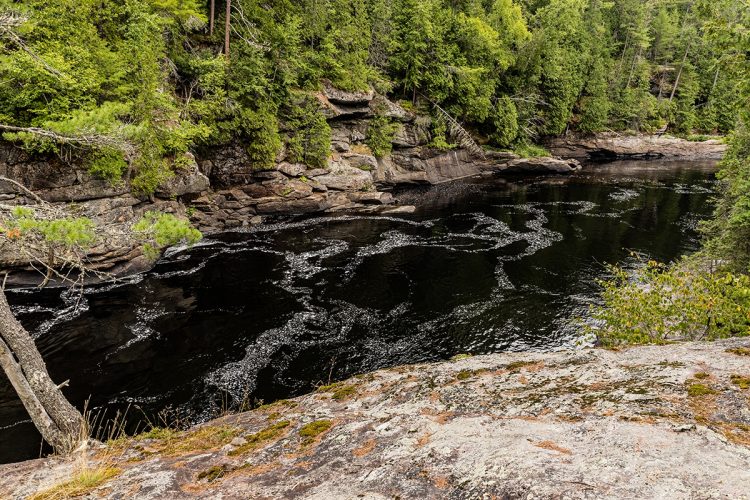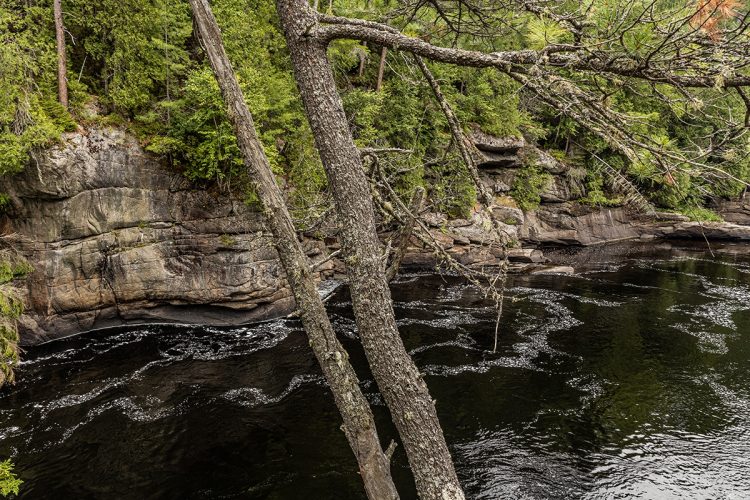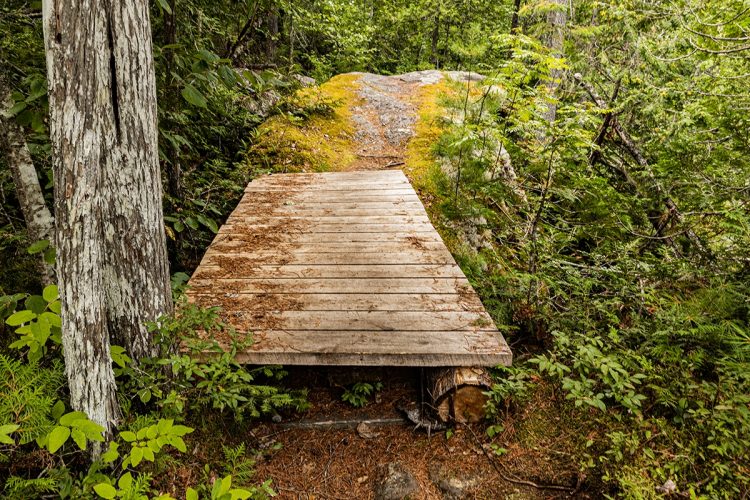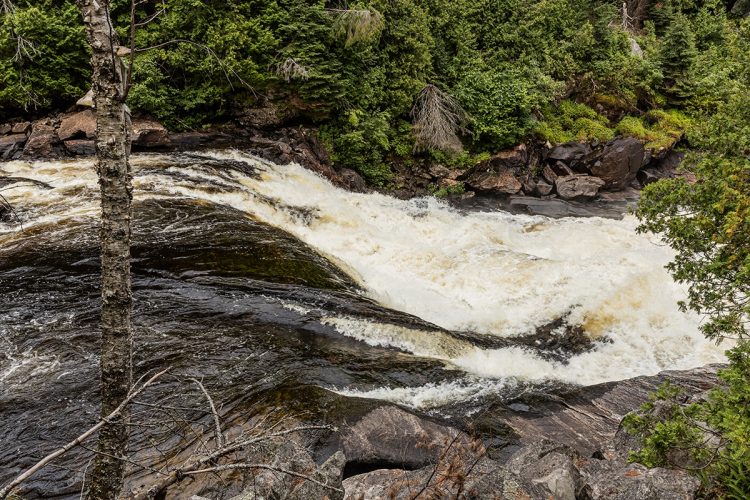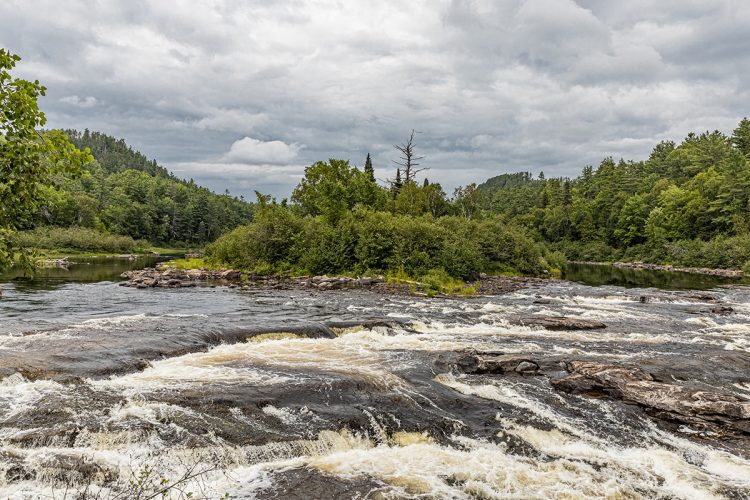Dumoine River Hiking Trails
Dumoine River Hiking Trails
TNO Les-Lacs-du-Témiscamingue, Témiscamingue
This zec covers a territory of 1,502 km2. The trails cross a mixed woodland. Some trails run along the Dumoine River, others lead to Six Miles Lake. The Dumoine trail follows the Wagon Trail, which was once used to feed forest farms. The Forest of the Great Ones loops over the mountain. Around the island runs Keal Island and offers a view of Lake Sangsues. The Mill Falls allows you to admire a series of falls.
- electrocardiogram Demanding
- mountain 26 Km (Mixed)
- calendar seasonal
Sections
Accès-Camp Trois Roche
- electrocardiogram Easy
- mountain 0.06 km (Linear)
Accès-Camps Fildegrand
- electrocardiogram Easy
- mountain 0.95 km (Linear)
Chemin d'accès-Camp Amik
- electrocardiogram Easy
- mountain 0.16 km (Linear)
Sentier-Belvédère Chemin de Portage Dumoine
- electrocardiogram Easy
- mountain 0.74 km (Linear)
Sentier-Chemin de Portage Dumoine
- electrocardiogram Easy
- mountain 26.10 km (Linear)
Sentier-Parcours Alternatif
- electrocardiogram Easy
- mountain 0.92 km (Linear)
Sentier-Point de vue de l'étang Steven
- electrocardiogram Easy
- mountain 0.08 km (Linear)
Traversée de la rivière Fildegrand
- electrocardiogram Easy
- mountain 0.06 km (Linear)
Trail-Chemin de Portage Dumoine
- electrocardiogram Easy
- mountain 26.10 km (Linear)
Trail-Point de vue de l'étang Steven
- electrocardiogram Easy
- mountain 0.08 km (Linear)
Trail-Belvédère Chemin de Portage Dumoine
- electrocardiogram Easy
- mountain 0.74 km (Linear)
Crossing of the Fildegrand River
- electrocardiogram Easy
- mountain 0.06 km (Linear)
Access-Camp Trois Roche
- electrocardiogram Easy
- mountain 0.06 km (Linear)
Access-Camps Fildegrand
- electrocardiogram Easy
- mountain 0.95 km (Linear)
Access Road-Camp Amik
- electrocardiogram Easy
- mountain 0.16 km (Linear)
Trail-Parcours Alternatif
- electrocardiogram Easy
- mountain 0.92 km (Linear)
Points of service and interest
Category Name
-
Parking Stationnement de la Grande Chute Dumoine 46°22'41.8"N
77°46'26.0"O -
Wild camping Camp Aygina-gwasing Sibi 46° 12.980' N
77° 51.218'O -
Wild camping Camp Rockcliffe 46° 13.774' N
77° 51.365'W -
Wild camping Camp Mukwa Beweetig 46° 15.635'N
77° 51.088'O -
Wild camping Camp Bateau de Drave 46° 15.913'N
77° 51.310'O -
Wild camping Camp Trois Rochesh 46° 16.456' N
77° 51.180'O -
Wild camping Camp Fildegrand 46° 17.470'N
77° 50.542'O -
Panorama Point de vue Belvédère Dumoine 46° 17.522' N
77° 51.287'O -
Wild camping Camp Bertrands 46° 17.795'N
77° 51.040'O -
Thin water Traversée de la rivière Fildegrand 46° 17.807'N
77° 51.011'O -
Wild camping Camp Amik 46° 17.825' N
77° 50.788'O -
Wild camping Camp Pattrons Chute - A 46° 18.716'N
77° 50.359'O -
Wild camping Camp Pattrons Chute - B 46° 18.758' N
77° 50.360'O -
Wild camping Camp Racinnes de Pins 46° 19.167'N
77° 50.015'O -
Wild camping Camp Potvin 46° 19.525' N
77° 49.565'O -
Wild camping Camp l'heure du Thé 46° 19.770'N
77° 49.677'O -
Wild camping Camps Cèdre 46° 20.171'N
77° 49.517'O -
Wild camping Camps Bois Carré 46° 20.183'N
77° 49.499'O -
Wild camping Camp Esker 46° 20.304' N
77° 49.268'O -
Wild camping Camp Grande Pin 46° 20.297' N
77° 49.215' O -
Wild camping Camp l'île Spectateur 46° 20.633' N
77° 48.975'O -
Wild camping Camp C FODA 46° 21.041' N
77° 48.809'O -
Panorama Point de vue sur l'étang Steven 46° 21.746' N
77° 49.333'O -
Wild camping Camp Robinson-B 46° 21.801'N
77° 48.350'O -
Wild camping Camp Robinson - A 46° 21.817' N
77° 48.331'O -
Wild camping Camp Marque de Bois 46° 22.226' N
77° 47.005'O -
Wild camping Camps Ankose 46° 22.351' N
77° 46.568'O -
Panorama Point de vue Chemin de Portage Dumoine 46° 22.420' N
77° 46.462'O -
Wild camping Camp Bellevue 46° 22.565' N
77° 46.392'O -
Wild camping Camp Ponens 46° 22.683'N
77° 46.289'O
Accessibility
Access Rights
Payable : See the website of Zec Dumoine
Directions to the starting point
From Témiscaming, take route 635 to Rapides-des-Joachims. Register at the Zec Dumoine registration office, located at 3, rue Principale in Rapides-des-Joachims. Drive to the territory of the Zec Dumoine following the signs for the sector of Grande-Chute, located 26 km further.
Parking: $3 per day
Natural Environment
History
Formerly, the territory of zec Dumoine was frequented by the Otaguottouemins, members of an Algonquin community. The families of this community generally lived in semi-nomadism according to the needs of hunting, picking wild berries (strawberries, raspberries, bluets...), protection, Native American trade... Beaver flooding and forest fires were both constraints and benefits. Regrettably, the terrible Spanish grid of 1918 decimated this community entirely.
The logging of the present zec territory began in 1850 when two forestry enterprises (E. B. Eddy’s ancestors and Consolidated Bathurst) began cutting down the white pines that were abundant in the southeast of Temiskaming. Moreover, north of the Dumoine zec, two hydronyms are significant:
White Pine lake and the White Pine river. This type of wood was highly in demand on the shipbuilding market in Europe, as they were used in particular for masts of sailing boats.
Geography
The Zec Dumoine covers an area of 1,502 km2, making it the 4th largest Zec in Quebec.
The zec Dumoine is located north of the Ottawa River. Its territory is between:
- the Zec de Rapides-des-Joachims, which is on the east side. The Dumoine River (flowing south) serves as a boundary between these two zecs, between Laforge Lake (north) and the Ottawa River (at Holden Lake);
- the Restigo zec and the Maganasipi zec, which are located on the west side.
Wildlife
Game is abundant in the zec Dumoine. It includes, among others, the elm, the white-tailed deer, the black bear, the hare, the grouse and the grouse. The zec recorded more than 120 species of birds and noted a strong presence of turtles.
Flora
The zec territory is located at the intersection of two important ecosystems: the boreal forest and the mixed forest. This forest area has a diversity of habitats, each with its own unique characteristics, such as large mature trees, rare-species trees and areas where wildlife is abundant.
Toponymy
Originally, the name Dumoine referred to the territory of the Lake and Dumoine River watershed. Several historians consider that this toponym would have been retained in memory of a member of a famous family of French traders. In 1697, Sieur d'Iberville, his younger brother Jean-Baptiste Le Moyne and a handful of men paddled on the Ottawa River to confront the English at Hudson Bay. Later, they explored the Mississippi and Jean-Baptiste Le Moyne earned a place in history as founder of New Orleans.
According to the section of the Dumoine River, the Algonquins named it "Aginagwasi sipi", "Cakawitopikak Sipi" and "Ekonakwasi Sipi" meaning "River of Alder" because of the many alders found on each side of its banks and rivers of desire.
Comments social0


